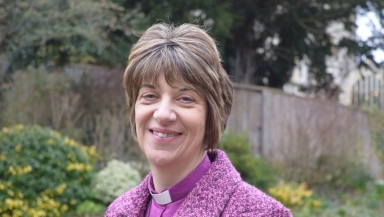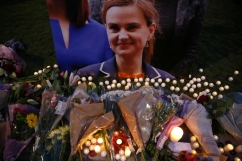As the two big political parties fight out their leadership battles in the aftermath of Brexit, there are any number of interesting angles.
One of them is that the UK could soon have its second female Prime Minister and its first since Margaret Thatcher left office 26 years ago. Theresa May is a strong candidate for the Conservatives, while Labour could be about to choose Angela Eagle as the challenger to Jeremy Corbyn's leadership. Ruth Davidson is increasingly popular as the leader of the Scottish Conservatives where she challenges the Leader of the SNP - Nicola Sturgeon. Plaid Cymru is led by Leanne Wood, while Natalie Bennett leads the Green Party.
Across the Pond, it's a straight fight between Donald Trump for the Republicans and Hillary Clinton for the Democrats to become president. Whatever you think of the merits of all of these politicians, there's a fair chance that in 2017, there could be women at the pinnacle of both British and American politics.
But what about the Church? Why is it that in 2016, with politics, business, and many other areas of public life slowly beginning to rectify the structural sexism that has held women back for so long, we still see so few large churches led by women?
Research published recently by the Church of England found that of the 112 large churches (defined as 350+ members) in England, only three were led by women. That means fewer than three per cent of large churches have a female at the helm. This compares very poorly to Parliament, with 191 female MPs, out of a total 650 (29 per cent), to board members of large companies (nine per cent of FTSE 100) and even to Hollywood Directors (seven per cent).
Three questions arise: Why is this the case? Why does it matter? And what can we do to change it?
Obviously this isn't just an issue pertaining to Anglican churches. Certain denominations which don't allow women to be in leadership roles won't be having this conversation. But for those in which women are able to partake in all forms of leadership there is still a disparity among those who lead, skewed towards men.
The Church of England research offers some helpful reflections on why this might be. It offers five reasons:
1) Time-lag: women are still reaching senior positions after only being allowed to be ordained in the early 90s.
2) Discrimination: the Church is candid here, suggesting, "both formal and informal discrimination in the context of selection, job applications, parish life, collegial relationships, job availability and HR policies."
3) Social processes: In other words, the expectation that men will lead and women usually won't.
4) Incompatible social roles and working conditions: Women often have family responsibilities which interfere with full-time, demanding jobs.
5) Organisational structures and dynamics: The whole way that the Church and its pipeline for leaders is constructed goes against women being in charge of big churches.
Into this mix I'd add another simple but very profound reason – visibility. If women don't see other women leading large churches, then a lack of role models and a tacit feeling that it isn't a job they'd be encouraged to do can take hold. I was once told by a talented, articulate female friend that though many of her male contemporaries had been asked if they might put themselves forward for ordination, she had never been asked. This has to change.
And why does this matter? Frankly, to be missing out on the leadership gifts of half of the population is a massive own goal for the Church. A body which only uses one side is not functioning at full capacity. As my friend Rev Alexandra Lilley, a curate in East London, says, "Men and women are made interdependent, in the image of God, and when we minister together we represent a richer reflection of what God is like. The Church has been lop-sided in its leadership and I am excited to see how God will grow a Church that has removed what has been a stumbling block for many."
In addition, the risk of a vicious cycle developing is obvious – a lack of women leading big churches makes it seem like women don't (or shouldn't) lead big churches. That becomes a self-fulfilling prophecy and the talents of young women are put into other fields rather than church leadership.
I've personally benefitted from the preaching, pastoral care and many, many other gifts of women who've had leadership roles. It would be a crying shame to leave many of these gifts untapped in larger churches – which often set the tone for smaller churches too.

So what can we do to change this? Well, we can start by acknowledging this as a massive problem. The kind of positive steps taken in politics won't be as easy to replicate in the Church – a central body imposing an 'all women shortlist,' for example, wouldn't be possible when there are fewer candidates for church leadership than there are to become an MP. In addition, these kind of decisions are mostly taken at a local level – a church gets a good level of input into its new minister in most denominations.
Instead, we need a steely determination to invest in women (yes young women especially, but women of all ages). We need to listen to what changes would help tackle the structural reasons listen above which are preventing women becoming church leaders. We need proactive encouragement of women from men who are currently in positions of power – from Bishops to megachurch pastors to theologians. Men need to be proactive in promoting women, listening to women and even be prepared to be replaced by women. Men need to be advocates for women in all levels of leadership. That's why I'm writing this – it's down to all of us to make change happen.
We have a big problem at the moment, but the problem is also rife with possibilities. If we can get this right and release women into leadership across the Church, a fresh wave of enthusiasm, talent and wisdom will be ours. Let's get on with it.
Follow Andy Walton on Twitter: @waltonandy


















